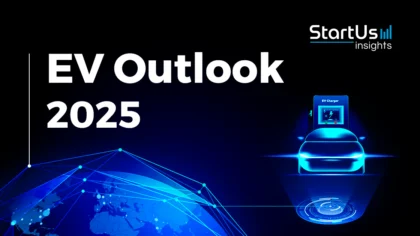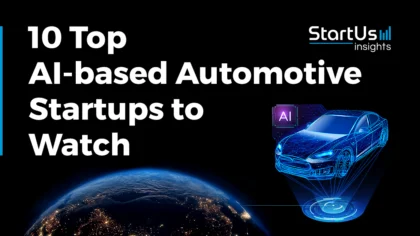The automotive industry is incorporating digital technologies at a breakneck speed. As automotive manufacturers embrace software, the focus of the action in the sector is moving from automotive manufacturing hubs to software hubs such as Silicon Valley. Innovations in the industry include autonomous vehicles, electrification, vehicle connectivity, shared mobility, and human-machine interfaces, to name a few. Autonomous and connected vehicles make use of technologies such as the Internet of Things (IoT) and artificial intelligence (AI) to enable solutions that often intersect with other applications. Shared mobility and electrification offer a way to make transportation more sustainable and carbon neutral. Electric vehicles are rapidly expanding to cities across the globe. Other technologies that automakers now incorporate in their designs include sensors, human-machine interfaces (HMI), and mixed reality.
Top 5 Global Startup Hubs: Automotive
Using our StartUs Insights Platform covering more than 1.116.000 startups and emerging companies, we analyzed the geographic distribution of global activity in the automotive industry. We identified 46 regional hubs* that observe high activity in developing technology-driven solutions across the industry like connected vehicles, usage-based insurance, electric vehicles, autonomous vehicles, etc.
Within these hubs, we analyzed a sample of 2.141 startups and emerging companies employing technology-driven solutions to innovate in the industry. Silicon Valley, London, New York City, Los Angeles, and Paris are home to 610 startups* and account for 28% of global automotive activity. Let us have a look at some of the innovative solutions from these 5 top hubs.
Based on our analysis of a sample of 2.141 emerging solutions, we observe that North America is home to 43% of global activity in the automotive sector. Several large automotive hubs in the US are driven by the presence of tech talent as the industry adopts solutions that combine software and hardware.
European automotive hubs in London, Paris, Tel Aviv, Berlin, etc. account for 36% of global activity and are situated in or around traditional auto manufacturing hubs. Emerging Asian automotive hubs in India and Singapore lead the region’s activity in the sector.
1. Silicon Valley: 243 Startups
With advances in the automotive industry, hardware-based startups are witnessing a comeback in Silicon Valley. Giants from both the tech and automotive sectors, including Apple, NVIDIA, BMW, Ford, General Motors, and Volkswagen are pursuing driverless car projects. Other tech-based solutions in the region include keyless entry, collision avoidance systems, and sensors.
Kodiak Robotics is a Silicon Valley startup that builds autonomous trucks for long-haul transportation. Its solution is built specifically for trucks and uses an array of sensors and computer vision to help trucks navigate. The intuitive human-machine interface enables the human driver to take control anytime, whether in autonomous or manual mode. By running 24 hours a day, Kodiak Robotics’ trucks are able to deliver goods faster across large distances.
2. London: 129 Startups
Government initiatives in the United Kingdom strengthen the automotive sector in London. The Centre for Connected and Autonomous Vehicles (CCAV) works closely with the industry, academia, and regulators to drive innovations in connected and autonomous vehicles. Launched in 2018, Road to Zero Safety aims to replace half of the new cars with zero or ultra-low emission technology by 2030.
Based out of London, By Miles offers usage-based insurance for car owners. The Miles Tracker is easy to install and fits under a car’s dashboard. The cost of each day’s driving is visible on both the app and an online dashboard. The mileage costs are capped at 241 km (150 miles) per day and 16.093 km (10.000 miles) per year. The startup’s comprehensive plan is fairer and cheaper than traditional insurance and enables drivers to plan for fuel costs.
3. New York City: 91 Startups
New York City boasts one of the most diverse tech talents in the US. In 2019, New York announced the formation of the Excelsior Automotive Technician Task Force to train technicians for jobs in the automotive sector. Earlier in 2020, the New York State Department of Public Service announced initiatives to promote EVs. These include the Make Ready program and Drive Clean Rebate initiative to speed up EV charging station deployment and offer rebates on the purchase of EVs, respectively.
FUELL is a New York-based startup that develops electric vehicles for urban mobility. Fllow is an electric motorcycle that offers a range of 241 km (150 miles) and a fast charge under 30 minutes. It also features an exclusive rear wheel motor, a connected dashboard, and 50 liters of storage. The design of the motorcycle is modular to facilitate battery or other technical upgrades. The startup also offers Flluid, an electric bike with a range of 200 km (124 miles).
4. Los Angeles: 78 Startups
According to a report by the Los Angeles Economic Development Corp (LAEDC), California aims to have 5 million EVs on the road by 2030. Thanks to the growth of electric cars, Los Angeles is rapidly emerging as a global automotive hub. The city is also focusing on the greater adoption of autonomous and shared mobility in time for the 2028 Olympics.
Los Angeles-based startup Ryde offers an online car-sharing platform. The peer-to-peer (P2P) rental marketplace primarily focuses on luxury cars and allows hassle-free booking by individuals or businesses. The startup provides roadside assistance and emergency support for every rental. It also screens both hosts and renters to ensure the safety of all users.
5. Paris: 70 Startups
Automation, electrification, and connectivity are the major automotive trends in Paris. Traditional manufacturers like Renault and PSA are working on electric vehicles, with free-floating car-pooling EV offerings from both companies running on the streets of Paris. Startups from the automotive research and development clusters in the Mobility Valley, such as Mov’eo, are introducing digital innovations to the industry.
Heex Technologies is a Parisian startup that develops a data management solution for autonomous vehicles. It uses sensors to extract data about critical situations and requests events writing and validation on a permitted blockchain. It then processes small sensors and events data and sends it securely to the cloud. The solution provides actionable insights quicker as compared to parsing large amounts of datasets to make autonomous fleets safer.
What’s next?
Trends like electrification and shared mobility will make transportation more energy-efficient and sustainable. Advances in connected vehicles will open up a range of contactless applications, including autonomous payments. As autonomous vehicles get better at navigating complex situations, their usage is bound to increase. As the boundaries between a tech company and an auto-maker collapse, expect innovations in vehicle designs and capabilities to proliferate.
*We define a hub as the regional geographic center of activity for this topic. It covers the center point with a radius of 100km. We define startups as those founded after 2015.









